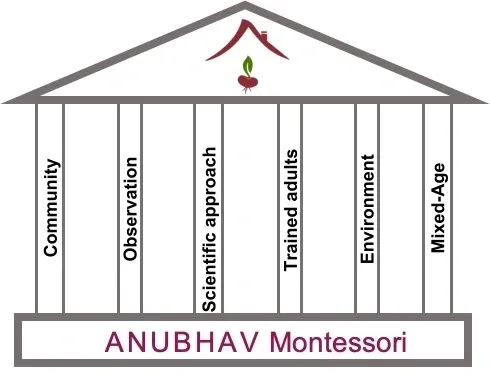What are the foundational principles and pillars of Anubhav Montessori?


- We build on the child’s interest to establish good habits that last a lifetime.
- We build on their inherent need to be independent and hence they trace a path of self-sufficiency from an early age. Children can express their needs from an early age and hence there will be less need for the child for crying or tantrums.
- Often in Math, we expect children to understand operations without giving them the how or why. We develop acronyms and mnemonic tools to help kids memorize the steps without asking why these strategies are even necessary. Montessori allows children to understand the how and why of concrete materials. Children are able to see division as distributing equally or subtracting many times. They perform math operations with different materials. This helps in reinforcing the concepts and with each material they move towards abstractions. Over time, having performed several operations with different kinds of numbers, they don’t feel the need to work with material anymore.
- Children in the Montessori environment understand that there are some tasks they must do alone and that they need each other to achieve their goals. Children know how to reach inward and outward. The inner teacher of a healthy Montessori child is more reliable than any methodology or even the guidance of a talented teacher.
- Children know how to work towards a goal, how to persevere when challenged, and how to connect in meaningful ways to the people in their home and school.
- Children from a young age understand that they belong to a community where they will help if necessary and seek help if they need it. The gift of the Montessori classroom is that children begin there with strong minds working alongside friends who know and love them almost as well as they know themselves.
- Montessori students know it is not only okay to be wrong, to try multiple ideas, to listen to alternate opinions, and create a knowledge base, but that it is expected, to create knowledge that applies to real life as opposed to simply an exam.
- Montessori education is known for fostering self-discipline, and creativity hand-in-hand with independence and social responsibility.
- A Montessori classroom provides the tools and support to build the all-important executive functions in young children. These include memory, problem-solving, resilience through hardship, flexible thinking, planning, prioritizing, strategizing, willingness to try new things social responsiveness(empathy).
